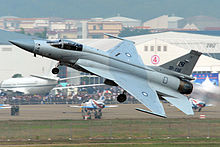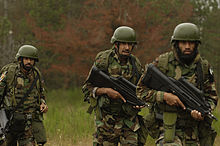The armed forces of Pakistan are the eighth largest in the world in terms of numbers in full-time service, with about 617,000 personnel on active duty and 513,000 reservists in 2010. They came into existence after independence in 1947, and the military establishment has frequently been involved in the politics of Pakistan ever since.[74] TheChairman joint chiefs (the current chairman is General Shameem Wynne) is the highest principle officer in the armed forces, and the chief military adviser to the government though the chairman has no authority over the three branches of armed forces. The three main branches are the Army (headed by General Ashfaq Parvez Kayani), the Navy (headed by Admiral Asif Sandila), and the Air Force (headed by Air Chief Marshal Tahir Rafique Butt), and they are supported by a number of paramilitary forces. The National Command Authority is responsible for employment, for control of the development of all strategic nuclear organisations and for Pakistan's nuclear doctrine under the nuclear defence theory. Pakistan's defence forces maintain close military relations with China and the United States and import military equipment mainly from them. The defence forces of China and Pakistan carry out joint military exercises. Conscription may be introduced in times of emergency, but it has never been imposed.
Since independence, Pakistan has been involved in four wars with neighbouring India, beginning in 1947 with the First Kashmir War, when Pakistan gained control of present-day Azad Kashmir and Gilgit–Baltistan. The two countries were at war again in 1965 and in 1971, and most recently in the Kargil War of 1999. The Army has also been engaged in several skirmishes with Afghanistan on the western border: in 1961, it repelled a majorAfghan incursion. During the Soviet war in Afghanistan, Pakistan shot down several intruding pro-Soviet Afghan communist aircraft and provided covert support to factions of theAfghan mujahideen through the Inter-Services Intelligence agency.
Apart from its own conflicts, Pakistan has been an active participant in United Nations peacekeeping missions. It played a major role in rescuing trapped American soldiers fromMogadishu, Somalia, in 1993 in Operation Gothic Serpent. Pakistani armed forces are the largest troop contributors to UN peacekeeping missions.
Pakistan maintained significant numbers of troops in some Arab countries in defence, training and advisory roles. During the Six-Day War in 1967 and the Yom Kippur War in October 1973, PAF pilots volunteered to go to the Middle East to support Egypt and Syria, which were in a state of war with Israel; they shot down ten Israeli planes in the Six-Day War. In 1979, at the request of the Saudi government, commandos of the PakistaniSpecial Service Group were rushed to assist Saudi forces in Mecca to lead the operation of the Grand Mosque Seizure. In 1991 Pakistan got involved with the Gulf War and sent 5,000 troops as part of a US-led coalition, specifically for the defence of Saudi Arabia.
Pakistani armed forces have been engaged in a war in North-West Pakistan since 2001, mainly against the Tehrik-i-Taliban Pakistan.Major operations undertaken by the Army include Operation Black Thunderstorm and Operation Rah-e-Nijat.



No comments:
Post a Comment